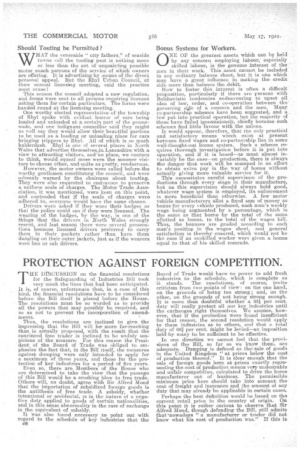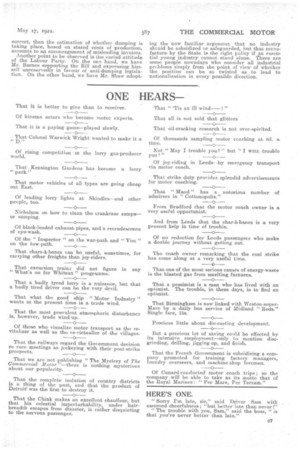PROTECTION AGAINST FOREIGN COMPETITION.
Page 2

Page 3

If you've noticed an error in this article please click here to report it so we can fix it.
THE DifSCUSSION on the financial resolutions for the Safeguarding of Industries Bill took very much the lines that had been anticipated. It is, of course, unfortunate that, in a case of this kind, the financial resolutions have to be considered before the Bill itself is placed before the House. The resolutions must be so worded as to provide all the powers that may possibly be required, and so as not to prevent the incorporation of amend
ments. I
Thus, the resolutions are inclined to give the impressiog that the Bill will bemore far-reaching than is actually proposed., with the result that the convinced free trader is inclined to be unduly suspicious of the ialeasiire. For this reasoe the President of the Board of Trade was obliged to emphasize the fact that, in the Bill itself, the measures against dumping were only intended to apply for a maximum of three years, and those for the protection of key industries for a period of five years. Even so, there are Members of the House who are determined to take the view that the passage of this Bill would be a crushing blow to free trade. Others will, no doubt, agree with Sir Alfred Mond that the importation of subsidized foreign goads is the antithesis of free trade. A subsidy, whether intentional or accidental, is in the nature of a negative duty applied to goods of certain nationalities, and in this sense abnormality in the rate of exchange is the equivalent of subsidy.
It was also found necessary to point out with regard to the schedule of key industries that the al
Board of Trade would have' no power to add fresh industries to the schedule, which is complete as it stands. The resolutions, of coerce, invite criticism from two points of view : on the one hand, on the grounds of being too strong; and, on theother, on the grounds of not being strong enough. It is more than doubtful whether a 33/ per cent. duty will really protect all our key industries until the exchanges right themselves. We assume, however, that if the protection were found insufficient for that reason, the second resolution would apply to these industries as to others, and that a. total duty of 66/ per cent. might be levied—an imposition held by many to be sufficient to be effective. In one direction we cannot feel that the provisions of the Bill, so far as we know them, are adequate. Dumping is defined as th.esale of goods in the United Kingdom " at prices below the cost of production thereof." It. is clear enough that the sale of foreign goods here at prices exactly representing the cost of production means very undesirable and unfair eompetition, calculated to drive the home manufacturer out of business. The permissible minimum price here should take into account the cost of freight and insurance and the amount of any duty that may already be applicable in.certain cases. Perhaps the best definition would be based on the current retail price in the country of origin. On this paint it is rather curious to observe that Sir Alfred Mond, though defending the Bill, still admits that. 'nowadays "a manufacturer or trader did not know what his cost of production. was." If this is correct, then the estimation of whether dumping is taking place, based on stated costs of production, amounts to an encouragement of misleading invoices. Another point to be observed is the varied attitude of the Labour Party. On the one hand, we have Mr. Barnes supporting the Bill and expressing himself unreservedly in favour of anti-dumping legislation. On the other hand, we have Mr. Shaw adopt ing the now familiar argument that no industry should be subsidized or safeguarded, but that; manufacture, by the State is the right policy if an essen. tial young industry cannot stand alone. There are sonic people nowadays who consider all industrial problems simply from the point of view of whether the position can be so twisted as to lead to nationalization in every possible direction.
































